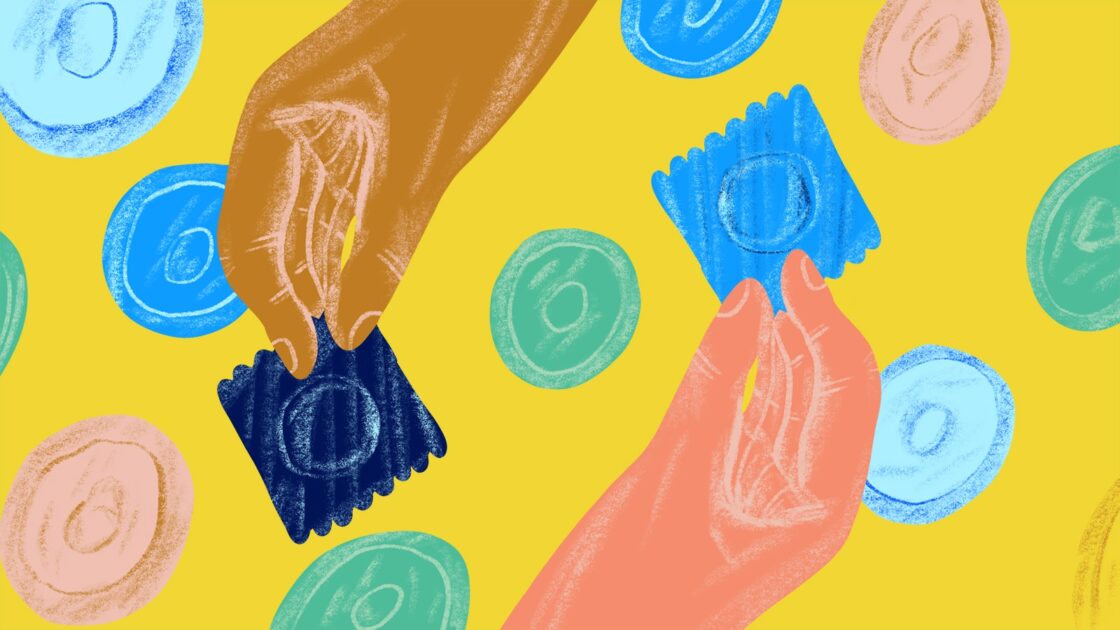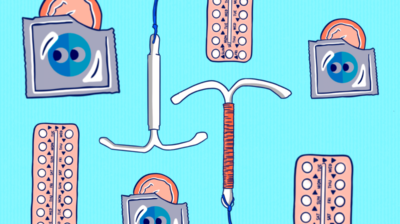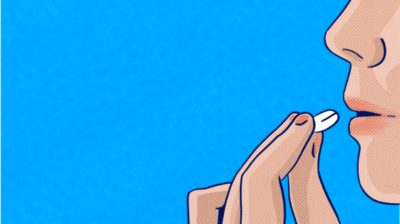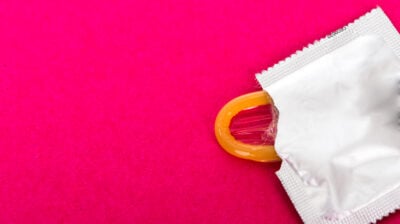How to use a condom
Condoms are the most effective form of protection against STIs

Condoms are the most effective form of protection against sexually transmitted infections (STIs) during vaginal sex, anal sex, or oral sex performed on a penis. They are also an effective contraceptive for preventing pregnancy. However, there are some forms of STIs that condoms cannot protect against, such as genital warts, genital herpes and pubic lice. Learning how to use a condom can take practice. It is important that they are used correctly, so if you ever feel that it isn’t put on right, it is best to take it off and start again with a new condom.
What are condoms?
Most condoms are made from a thin latex, which covers the penis before coming into contact with a sexual partner. Some people are sensitive to latex, and many manufacturers also make latex-free condoms. Condoms are 98% effective when used properly.
They come in a wide variety of flavours and shapes: all intended to enhance your pleasure and safety. However, it’s important to be able to use condoms correctly in the heat of the moment. A condom is easy to use – once you get the hang of it. Practice makes perfect, so learn how to use one before you find yourself in a situation where you need one.
It is important to remember that, like all contraceptives, condoms are not 100% effective. Some people use condoms with another method to protect against pregnancy and STIs. Talk to your doctor to find out about the contraceptive that will work best for you. It’s just as important for those who cannot get pregnant to use condoms if having penetrative sex (penis inside a vagina, mouth or anus). This is to prevent the risk of HIV and other Sexually Transmitted Infections.
Where can I buy condoms?
Condoms are available in pharmacies, supermarkets, vending machines in nightclubs and pubs, STI clinics and often in student unions and health centres. Always buy condoms with a quality mark (Kite or CE mark). Health clinics and students unions will often give away free condoms.
When should I use a condom?
Ideally, you should use a condom every time you have sex. Remember, even the smallest drop of fluid from the penis during the early stages of an erection (pre-cum) can contain sperm and STIs. You should always use a condom if you’re uncertain of your partner’s sexual history or if you know your partner has HIV or any other STI. STIs can also be transmitted through oral sex performed on a vagina or anus. Dental dams are the best form of protection here.
How to use a condom:
- Always put a condom on well before you start to have sex or touch your partner’s genitals. You might not notice it, but some semen comes out of the penis before ejaculation
- Make sure the condom fits securely on the hard penis (erection): you can buy condoms in different sizes
- Don’t let anything sharp (fingernails, jewellery, scissors) damage the condom when you open the package
- Squeeze out any air in the tip of the condom before putting it on. An air bubble can cause it to tear during sex
- Unroll the condom down the length of the hard penis. Leave a little space at the tip for semen
- Check that the condom is on the right way round. Do this by checking which way it rolls. If you have problems rolling it on, it is probably because it is on inside out, so you will have to start over with a new condom
- When pulling out after sex, hold the base of the condom and be careful when removing the condom that you don’t spill any semen. Also, keep the penis away from the vagina as it will still be covered with semen
- Wrap the condom and dispose of it safely and hygienically (not down the toilet)
Tips on using condoms:
- If the condom splits or you forget to use one, act quickly. Find out more about emergency contraception
- It is advised that you do not store condoms in your pocket as it can damage them
- If you need a lubricant, make sure it’s water based. Don’t use Vaseline, massage oil, baby oil or moisturiser because they can damage the condom very quickly
- Only use a condom once. Never ever reuse it
- Make sure to check the expiry dates on the packet of the condoms. If they are out of date, don’t use them
- Wearing more than one condom at a time can create friction and could cause both condoms to rip
Will I be able to feel everything?
You may notice a very slight loss of sensitivity. However, condoms are constantly being updated for enhanced sensitivity and to feel more natural.
Do condoms make sex less spontaneous?
No, there’s no need for things to come to an abrupt halt. When you use them regularly, you should find that putting on a condom can add an exciting new twist to your foreplay. Make sure you’ve stocked up on safety precautions by having condoms at home. Never ever feel pressured to have sex without a condom.
How can I protect myself against STIs?
There are many great options to help protect your sexual health, but none of them are 100% effective. Even if you use condoms every time you have penetrative sex, you are still at risk of getting genital warts and herpes, as these can be passed through skin-to-skin contact. Going for an STI check or taking a home STI testing kit with a partner before having sex, can be a great way of protecting yourself and those you have sex with against STIs and HIV. However, not all STI checks check for all STIs, so it is important to speak to your healthcare provider and ask them what is being tested for as part of your screening.
Discussing with your sexual partners the type of contraception or protection options available to you, and agreeing on a type that works for everyone involved can help to reduce the risk of pregnancy, STIs and HIV. Looking out for sores or symptoms on a partner’s genitals before having sex with them, can help to identify STIs that they may not be aware of. If you do see any signs that someone may have an STI, do not have sex with them until you know for certain it is safe to do so. Asking someone about their sexual health history is the responsible thing to do before having sex, and it should not be taken as an insult if someone asks you about yours.
Remember: The age of sexual consent in Ireland is 17. If you’re over 16, you can consent to medical treatment including any treatment or tests needed.
Illustrations by Marina Marinina.
Feeling overwhelmed and want to talk to someone?
- Get anonymous support 24/7 with our text message support service
- Connect with a trained volunteer who will listen to you, and help you to move forward feeling better
- Whatsapp us now or free-text SPUNOUT to 50808 to begin.
- Find out more about our text message support service
If you are a customer of the 48 or An Post network or cannot get through using the ‘50808’ short code please text HELLO to 086 1800 280 (standard message rates may apply). Some smaller networks do not support short codes like ‘50808’.






